Director: Steven Soderbergh
By Christopher Small
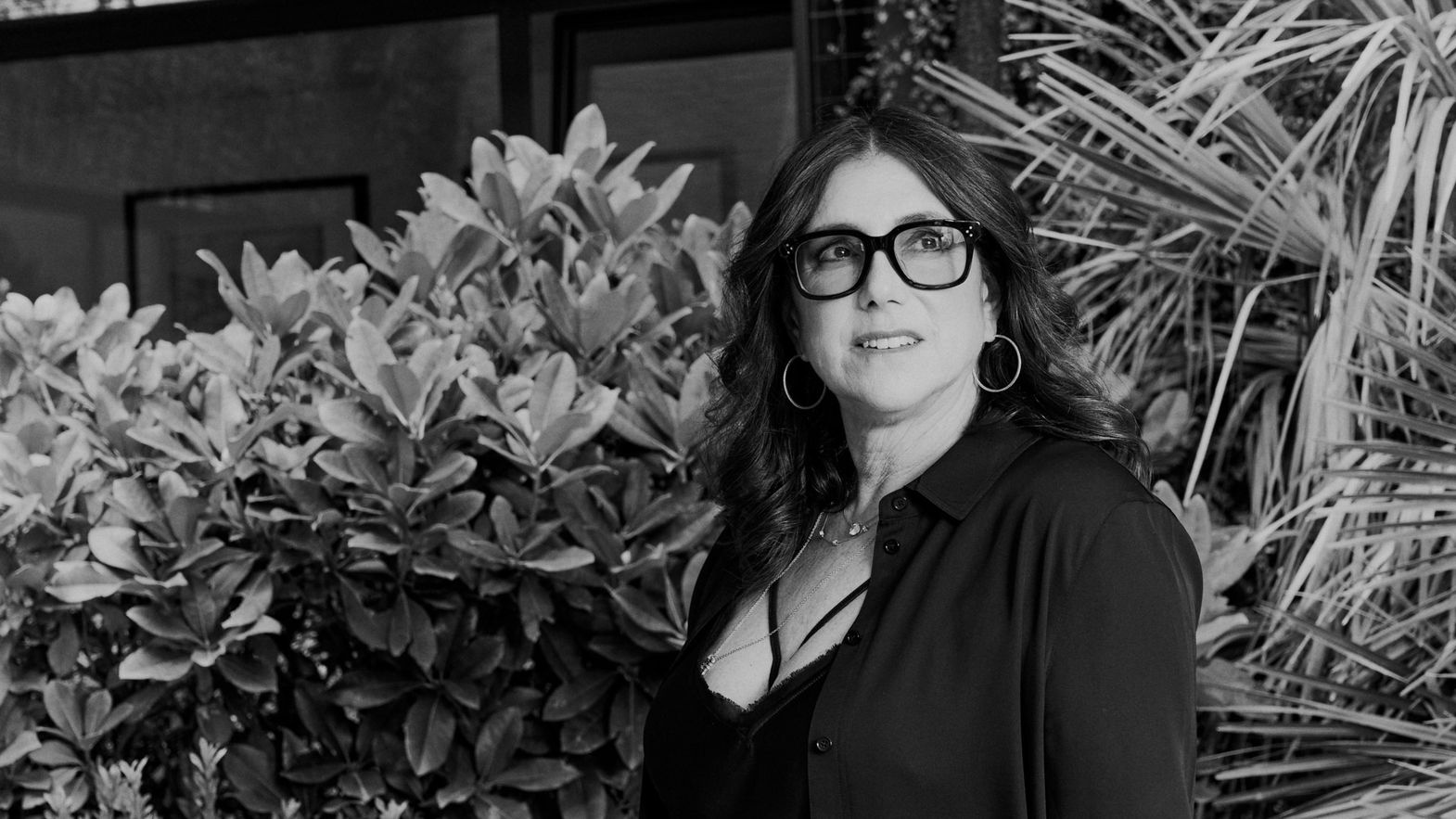 ©Davide Padovan
©Davide Padovan
At the 2024 Academy Awards, the screenwriter Cord Jefferson, winning for American Fiction (2023), implored Hollywood to take risks on, say, 20 $10 million movies or 50 $4 million movies rather than make a single $200 million blockbuster. I think that’s a good place to start when thinking about your career.
Yeah, it was inspiring to hear him say that, but I would also pass the gauntlet to filmmakers. New filmmakers are what renew the business, after all – new voices, new points of view – and with them come new audiences. Look at A24 and how that's become a brand that matters. Or look at what Universal did this year. It won Best Picture with an auteur film – Oppenheimer (2023), an unlikely movie to make almost a billion dollars – but also a full slate of films that were each very distinct. I’m not looking to crap on superhero movies, but for a while we were seeing filmmakers go from indie to superhero movie, and that would be it. I say take the risk. To quote the great William Goldman, nobody knows anything. Who knew that the sure thing last year was going to be a $100 million movie about the father of the atomic bomb or an adaptation of the Barbie doll, something people have tried to do for 25 years. Poor Things (2023) made $100 million dollars worldwide. Filmmakers also must be courageous in putting their original voice out there.
I’m also curious how you, as a producer, live with the uncertainty of risk-taking. Uncertainty seems to be your modus operandi.
Look, no one sets out to make a movie that doesn’t work either creatively or financially. I grew up with the great ‘70s filmmakers – filmmakers that were really invested in reaching the most people possible, but also in telling stories that were about something, even in the context of genre. At our company, Jersey Films, myself and my partners Michael Shamberg and Danny DeVito admired many filmmakers but those that we actually pursued – like Quentin Tarantino or Steven Soderbergh – were interested in doing that: telling a singular story in an original voice and reaching as many people as possible.
I’m not looking to crap on superhero movies, but for a while we were seeing filmmakers go from indie to superhero movie, and that would be it. I say take the risk. To quote the great William Goldman, nobody knows anything.
As a producer, you seem to have repeatedly found yourself at moments of transformation in the industry. You worked with so many now-iconic directors on their first or second films, small movies that would utterly transform the landscape. I'm wondering what your reflections on that are, but also if you think we're at a turning point right now.
As long as I’ve been working in the industry, people have said to me, “You missed it. You missed the good old days of Hollywood.” Because of that, I’ve always had this sense that we were chasing this golden age. But I didn’t think about any seismic shifts when I was sneaking into R-rated Hal Ashby or Martin Scorsese movies as a kid. My career doesn't really make sense unless you look at it in retrospect; it’s always been kind of scrappy.
People would tell me that it would’ve been simpler if I could have just done romantic comedies or action films, but that hasn’t been what I’ve followed. Even Django Unchained (2012), the biggest budgeted indie film ever made – that certainly did not seem like a sure thing to anyone who was making it. People said the genre won’t work, the setting is risky, and so on. The only solid bet was Quentin. But we all believed in every part of it, we knew it would work. Or look at Contagion (2011): it was a hit when it came out, but it came to mean something else in the context of the pandemic, when it became the number one movie in the world. The reviews for films like mine are only really written 10, 15, 20 years after the fact.
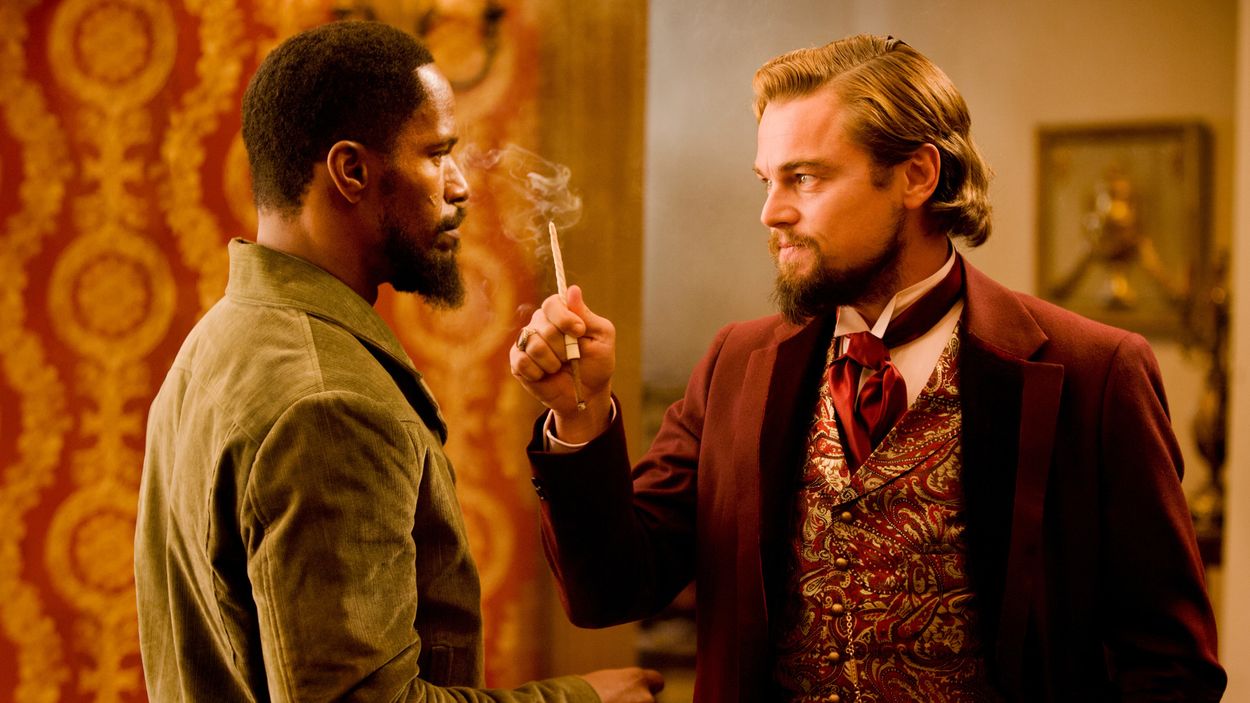 ©2012 Columbia Pictures Industries, Inc. All Rights Reserved
©2012 Columbia Pictures Industries, Inc. All Rights Reserved
The more Greta Gerwigs and Sofia Coppolas and Kathryn Bigelows and Celine Songs we have, the more young girls are going to think, “There’s a job I could do.”
I also wanted to ask about your early mentors, like Debra Hill, who you worked with on Terry Gilliam’s The Fisher King (1991), and about what it was like for you, as a feminist, starting out in that era.
Debra was the best; I miss her every day. She taught me that there’s no task too big or too small for a producer. Getting an actor hot water and honey and lemon to protect their voice – you do it. We’re all one crew when we’re on set, trying to make something great and to get through the day. That was a valuable lesson that has stayed with me. Sometimes the curse of my career is that I have been slightly ahead of my time. Certainly, my focus on female-led films has made things an uphill battle sometimes. I just forged a path forward – and maybe it’s because I had somebody like Debra or the great Polly Platt or Gale Anne Hurd or Kathleen Kennedy; I could see them do it. What there weren’t at that time were women filmmakers. The more Greta Gerwigs and Sofia Coppolas and Kathryn Bigelows and Celine Songs we have, the more young girls are going to think, “There’s a job I could do.”
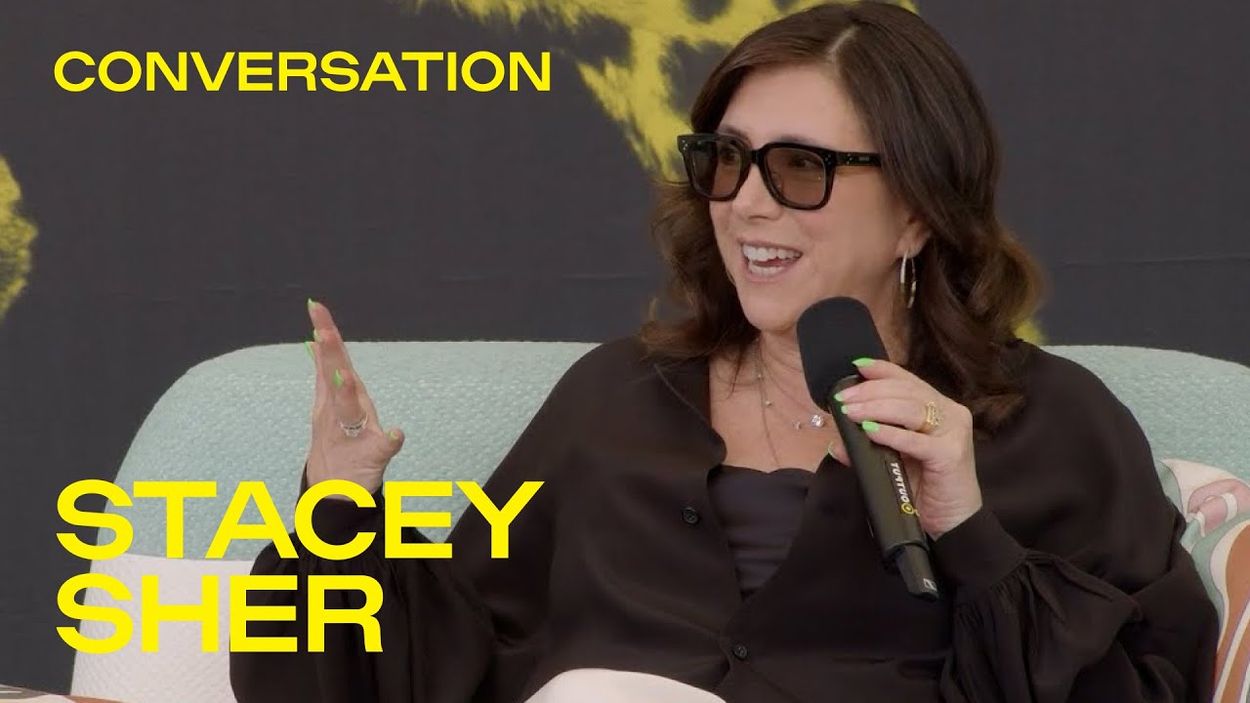
One of your first acts as a producer was to bring the script for Tarantino’s Pulp Fiction (1994) to your partners at Jersey Films, even before he premiered Reservoir Dogs (1992) at Sundance.
It’s funny how that happened; I used to check this column in Variety and the Hollywood Reporter that listed movies in the early stages of production. Basically, it was intended for people to send their résumés to work on the crew. But if I spotted a movie that had an incredible cast and an unknown filmmaker, I would get hold of the script and read it – and that's how I read Reservoir Dogs. It had Harvey Keitel and all these incredible people attached. I knew Lawrence Bender, the producer, but I still hadn't met Quentin.
Eventually Lawrence's roommate turned to me one night and said, “I’m going to make your night; meet Quentin Tarantino.” We met, we loved the same movies, we shared a lot of the same references, had a similar sensibility. And at Jersey Films, we had the flexibility to make a blind deal for Quentin's second film. Here was the pitch we went on: three stories that are one story; it’s called Pulp Fiction; it’s set in L.A. On that basis, we made the deal. What Danny [DeVito] was able to provide, because of his leverage as a movie star and director, was final cut. That was a magnet for a filmmaker like Tarantino. After Cannes with Reservoir Dogs, he and Roger Avary were working on the script intensely. We all had tremendous community as makers of films – that has been lost a little bit.
Everybody was telling us, “Nobody’s going to see [a movie like Erin Brockovich],” or “Julia Roberts is the biggest movie star in the world, no way she does a movie like this.” Sure enough, we kept going and, well, it worked.
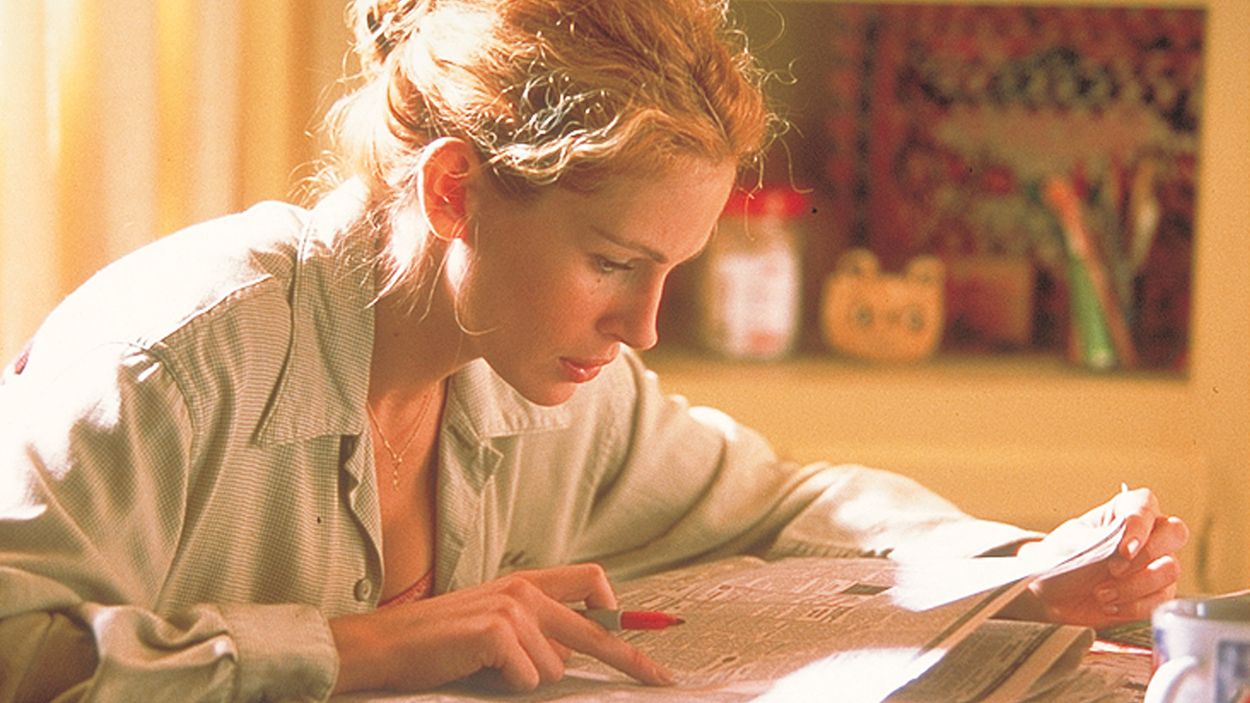 ©2012 Columbia Pictures Industries, Inc. All Rights Reserved
©2012 Columbia Pictures Industries, Inc. All Rights Reserved
Can you talk about the moment you see that a movie like Pulp Fiction or Erin Brockovich (2000) is coming together and you realize that you might have something special, something iconic?
Well, I never think about it that way; if you do, you’re in trouble. I find a story I love, and I follow it through to the end, when it’s an actual film. It can be improbable. We met the real Erin Brockovich through Michael Shamberg’s wife, Carla. Luckily, she wasn’t so jaded that when her chiropractor told her, “I have a patient and her story would make an incredible movie,” she didn't say, “Yeah, yeah, yeah.” She met [Erin] to hear her out. Then she told Michael that she’d heard this incredible story – Julia Roberts is going to play her one day, it’s going to win an Oscar, and so on. Michael’s response was, “You'll never get Julia Roberts to do a part like this.” Carla was not deterred. She pitched it to me; I fell in love with it. It’s Rocky (1976) in a miniskirt, we always said.
Again, we were able to make a blind deal there and then to option the rights to Erin’s story. The way the studio system worked at that time meant that a company like ours had funds to take on a few riskier projects. We were taking shots on Pulp Fiction, or Erin Brockovich, or later World Trade Center (2006), which was the last thing I did with Debra Hill – or improbable hits like How High (2001) or Garden State (2004). Those are not obvious choices to make on paper; they became ‘obvious winners’ once they became hits. When I pitched Erin Brockovich to Steven Soderbergh, his first response was “That’s a horrible idea for a movie.” But we persisted, and he soon came around. Everybody was telling us, “Nobody’s going to see your movie,” or “Julia’s the biggest movie star in the world, no way she does a movie like this.” Sure enough, we kept going and, well, it worked.
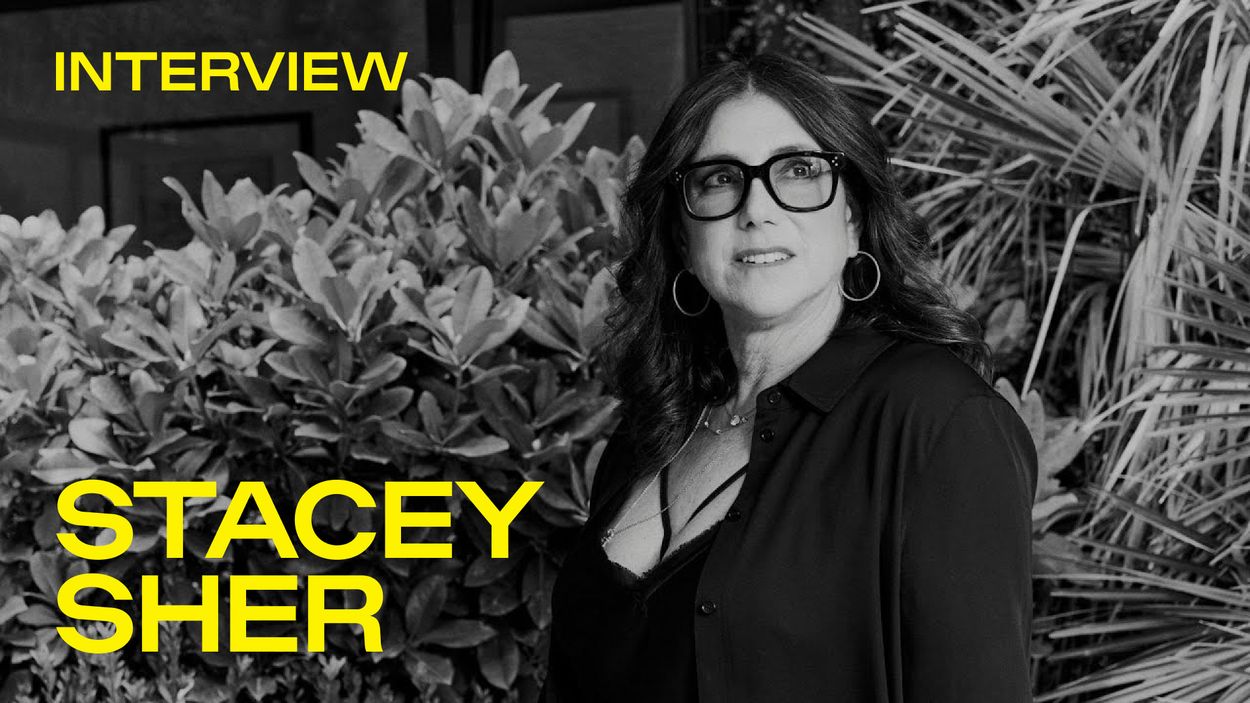
You chose it for your tribute here in Locarno, so can you talk about the making of Django Unchained, since – as you said – it was a pretty giant independent production?
Yeah, I remember screening a batch of dailies for the final Candyland sequence, which was a huge challenge to shoot, for Columbia [Pictures], our international partner on the movie. When we got to the destruction of Candyland – these huge explosions – I was kind of surprised that nobody oohed and aahed. And then I realized, it’s because they’re so used to special effects like that not being practical. It had been such a stressful day on set. There was lightning in the fields and you really can’t rig explosives if there’s lightning. There were two cameras and giant cranes that were holding these massive lights. And Quentin and Bob [Richardson, cinematographer] were in a pit with plexiglass over them. I was worried that they were too close to the explosions, that the fires were burning too hot, that it would compromise the cranes and come crashing down on them. Nightmare. And I roll those dailies and the Columbia people are like “Yeah, cool.” [laughs]
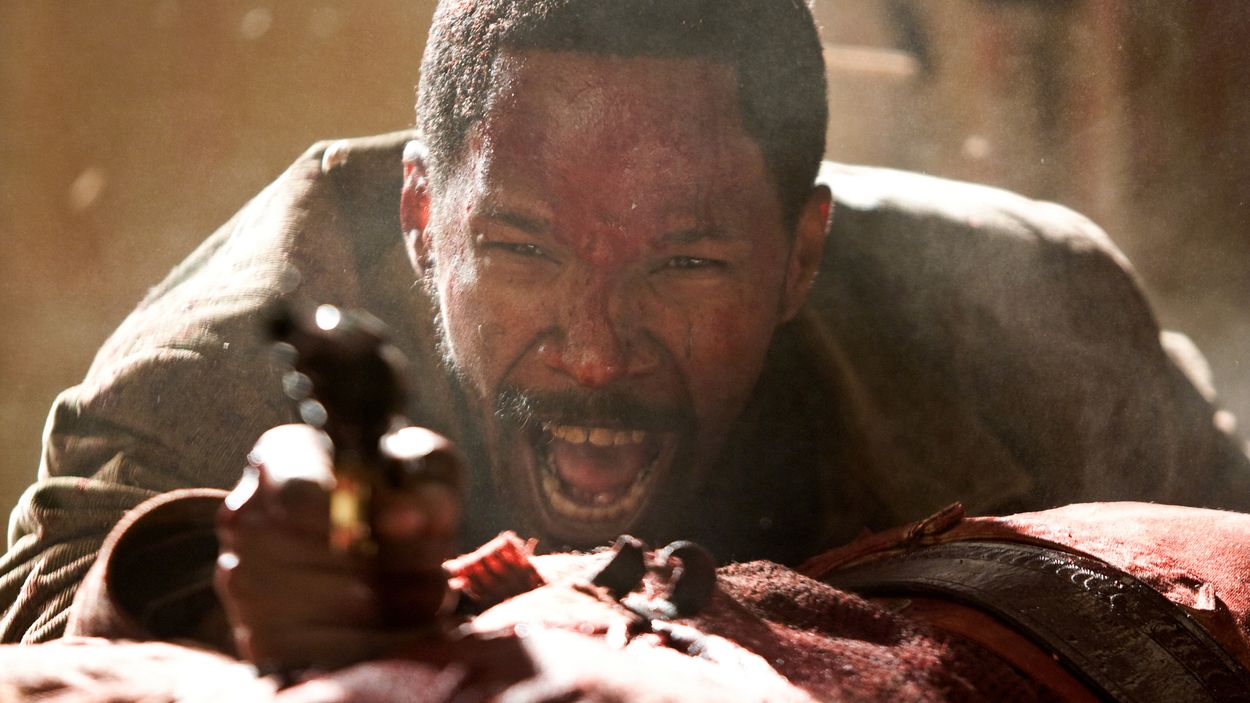 ©2012 Columbia Pictures Industries, Inc. All Rights Reserved
©2012 Columbia Pictures Industries, Inc. All Rights Reserved
Here was the pitch [from Tarantino]: three stories that are one story; it’s called Pulp Fiction; it’s set in L.A. On that basis, we made the deal.
Film festivals themselves have also played a decisive role with a lot of the films that you've produced. What do film festivals and the recognition of a prize like the Locarno Raimondo Rezzonico Award mean to you?
As it was so beautifully put at the Oscars: movies create memories and memories create history. Even though Django is a Western, it shows the ugliness of America's history in a way that you can't look away from because it’s so entertaining. Or Erin Brockovich, which reminds us that corporations are not always looking out for our best interests. Film festivals are launching pads for filmmakers. After Quentin went all over the world with Reservoir Dogs, for example, he created a relationship with global audiences and journalists that became his earliest boosters, which helped us on Pulp Fiction and beyond. The audience at festivals – whether it’s Locarno, Sundance, Cannes, Toronto, Berlin – are hugely important. As for getting this award, I’m reminded of a story from when I was making Get Shorty (1995). Our costume designer was very close with Neil Young; we were out shopping for the movie and she said, “I need to drop off Neil’s suit for his Lifetime Achievement Award ceremony tonight.” I was a big fan and super eager to meet him. When I asked him about the award, he simply said, “Put me back in the oven – I'm not done yet.”